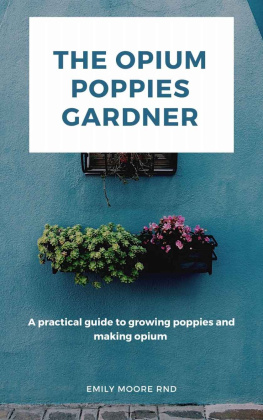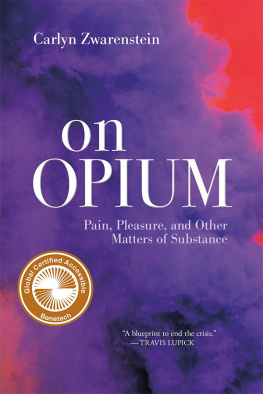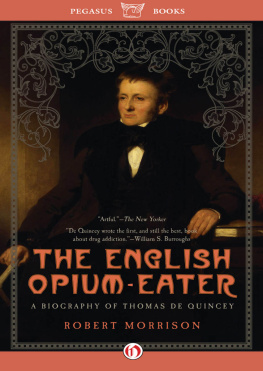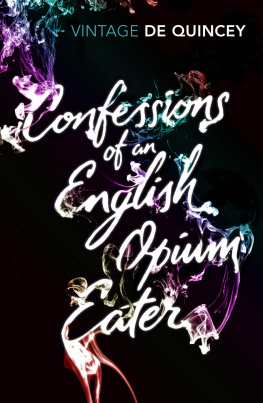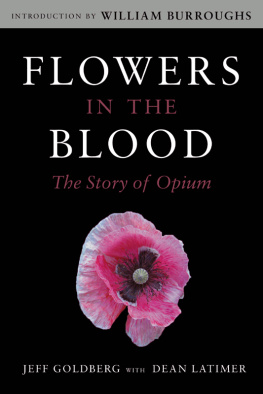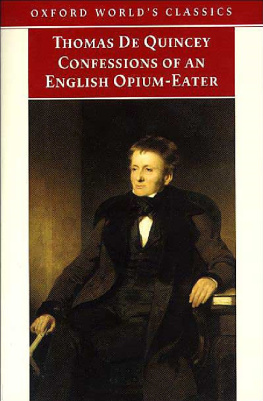
CONFESSIONS OF AN ENGLISH OPIUM-EATER AND OTHER WRITINGS
THOMAS DE QUINCEY was born in 1785 at Manchester. As a boy he was a brilliant Latin and Greek scholar, although he was unhappy both at home and at school. He ran away from Manchester Grammar School and went wandering through Wales, after which he went to London, where for several months he led an impoverished life. This period is vividly described in the Confessions. In 1804 he went to Worcester College, Oxford, but he failed to take his degree. It was there that he first began his correspondence with Wordsworth and also his opium addiction. From his early youth De Quincey had been a reverent admirer of Wordsworth and, to a lesser degree, Coleridge, and between 1809 and 1821 he rented Dove Cottage in Grasmere. His publication of the Recollections of the Lakes and the Lake Poets precipitated the end of his connection with the Wordsworths. In 1817 De Quincey married Margaret Simpson. He endeavoured to support their large family by writing for literary miscellanies but spent most of his adult life evading arrest for debt. Confessions of an English Opium-Eater, which ran through more than two dozen book editions by the end of the century, was first published in the London Magazine in 1821. But the majority of De Quinceys writing appeared in Blackwoods Edinburgh Magazine, which published two sequels to the Confessions: Suspiria de Profundis in 1845 and The English Mail-Coach in 1849. At the end of his life, De Quincey enjoyed a brief period as an eminent man of letters, receiving visits from international admirers and overseeing the first volumes of his collected works. He died in Edinburgh in 1859.
BARRY MILLIGAN is the author of Pleasures and Pains: Opium and the Orient in Nineteenth-Century British Culture. He has also published several essays on Romantic and Victorian literature and history and is co-editor, with Ghislaine McDayter and Guinn Batten, of Romantic Generations: Essays in Honor of Robert F. Gleckner. His research awards have included a Mellon Postdoctoral Fellowship in the Humanities and several visiting research fellowships at the Wellcome Institute for the History of Medicine, London. He has taught at Duke and Cornell Universities and currently teaches at Wright State University in Dayton, Ohio.
THOMAS DE QUINCEY
Confessions of an
English Opium-Eater
AND OTHER WRITINGS
Edited with an Introduction and Notes by
BARRY MILLIGAN
PENGUIN BOOKS
PENGUIN BOOKS
Published by the Penguin Group
Penguin Books Ltd, 80 Strand, London WC2R 0RL, England
Penguin Putnam Inc., 375 Hudson Street, New York, New York 10014, USA
Penguin Books Australia Ltd, 250 Camberwell Road, Camberwell, Victoria 3124, Australia
Penguin Books Canada Ltd, 10 Alcorn Avenue, Toronto, Ontario, Canada M4V 3B21
Penguin Books India (P) Ltd, 11, Community Centre, Panchsheel Park, New Delhi 110 017, India
Penguin Books (NZ) Ltd, Cnr Rosedale and Airborne Roads, Albany, Auckland, New Zealand
Penguin Books (South Africa) (Pty) Ltd, 24 Sturdee Avenue, Rosebank 2196, South Africa
Penguin Books Ltd, Registered Offices: 80 Strand, London WC2R 0RL, England
www.penguin.com
Confessions of an English Opium-Eater first published in London Magazine in 1821;
Suspiria de Profundis and The English Mail-Coach first published in Blackwoods
Edinburgh Magazine in 1845 and 1849 respectively.
This selection published in Penguin Classics 2003
1
Editorial material copyright Barry Milligan, 2003
All rights reserved
The moral right of the editor has been asserted
Except in the United States of America, this book is sold subject
to the condition that it shall not, by way of trade or otherwise, be lent,
re-sold, hired out, or otherwise circulated without the publishers
prior consent in any form of binding or cover other than that in
which it is published and without a similar condition including this
condition being imposed on the subsequent purchaser
Contents
Acknowledgements
The editor would like to thank Greg Anderson for substantial help with Latin and Greek passages and matters of Graeco-Roman culture in general, Sue Phillpott for her expert copy-editing and other significant contributions and Laura Barber, Carol Engelhardt, Michael Ferejohn, Henry Limouze, Grevel Lindop, Robert Mighall, Joan Milligan, Jennifer Spalding and Lindeth Vasey for various kinds of advice and assistance. Thanks are also due to the University Press of Virginia for permission to include a revised portion of the editors Pleasures and Pains: Opium and the Orient in Nineteenth-Century British Culture (1995) in the Appendix. Finally, this edition is indebted to those editors who have gone before, especially Grevel Lindop and Alethea Hayter.
Chronology
1781 Posthumous publication of Jean-Jacques Rousseaus Confessions.
1785 15 August: birth of Thomas Penson Quincey in Manchester (his mother alters the name to the more aristocratic-sounding De Quincey in 1796).
1788 Birth of Lord Byron.
1789 Storming of the Bastille marks the beginning of the French Revolution.
1792 Death of sister Elizabeth, the first great trauma of De Quinceys life. Birth of Percy Bysshe Shelley.
1793 Death of De Quinceys father.
1795 Embassy to Peking of Lord Macartney, charged with improving Anglo-Chinese trade relations. Birth of John Keats.
1796 De Quincey moves with his family to Bath and enters Bath Grammar School. Birth of Margaret Simpson, his future wife, at Grasmere in the Lake District.
1797 Samuel Taylor Coleridge drafts Kubla Khan (published 1816).
1798 William Wordsworth and Samuel Taylor Coleridges Lyrical Ballads published.
1799 De Quincey enters Winkfield School in Wiltshire. Wordsworth completes the first version of his autobiographical poem ultimately known as The Prelude.
1800 De Quincey enters Manchester Grammar School. France defeats Austria at the Battle of Marengo in Italy during the Napoleonic Wars.
1802 De Quincey runs away from school to ramble in Wales, then goes to London.
1803 Enters Worcester College, Oxford; writes to Wordsworth for the first time. German pharmacist F. W. A. Sertrner isolates a crystalline alkaloid of opium and dubs it morphium.
1804 According to De Quinceys later claim in the Confessions, he first takes opium this autumn.
1805 Britains Navy defeats Frances at the Battle of Trafalgar. Wordsworth completes the second version of his autobiographical poem ultimately known as The Prelude.
1807 De Quincey meets Wordsworth at Grasmere.
1808 Leaves Oxford without taking a degree.
1809 Oversees publication of Wordsworths pamphlet criticizing the Convention of Cintra, an agreement made between the French, British and Portuguese during the Peninsular War (180814). Moves into the Wordsworths former home, the cottage at Town End at Grasmere (later known as Dove Cottage). Wellingtons forces defeat Napoleon at the Battle of Talavera in Spain during the Peninsular War. Birth of Edgar Allan Poe.
1812 De Quincey reads law briefly. Wordsworths daughter Kate dies, plunging De Quincey into deep mourning. Wellington defeats French forces at the Battles of Badajoz and Salamanca in Spain, turning the tide towards ultimate British victory in the Peninsular War. First two cantos of Byrons Childe Harolds Pilgrimage published. Birth of Charles Dickens.
1814 Sir Walter Scotts Waverley
Next page

